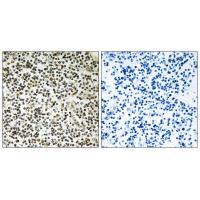
| WB | 咨询技术 | Human,Mouse,Rat |
| IF | 咨询技术 | Human,Mouse,Rat |
| IHC | 1/50-1/100 | Human,Mouse,Rat |
| ICC | 技术咨询 | Human,Mouse,Rat |
| FCM | 咨询技术 | Human,Mouse,Rat |
| Elisa | 咨询技术 | Human,Mouse,Rat |
| Aliases | centrosomal protein 152 kDa; centrosomal protein 152kDa; centrosomal protein of 152 kDa; |
| Entrez GeneID | 22995; |
| WB Predicted band size | 140kDa |
| Host/Isotype | Rabbit IgG |
| Antibody Type | Primary antibody |
| Storage | Store at 4°C short term. Aliquot and store at -20°C long term. Avoid freeze/thaw cycles. |
| Species Reactivity | Human,Mouse |
| Immunogen | Synthesized peptide derived from internal of human CEP152. |
| Formulation | Purified antibody in PBS with 0.05% sodium azide. |
+ +
以下是关于CEP152抗体的3篇代表性文献及其摘要:
1. **文献名称**:*Mutations in the CEP152 gene are associated with primary microcephaly*
**作者**:Guernsey DL, et al.
**摘要**:该研究通过全外显子测序发现CEP152基因突变与常染色体隐性原发性小头畸形相关。研究利用CEP152抗体进行免疫荧光实验,证实突变导致患者细胞中中心体结构异常,影响纺锤体形成和神经发育。
2. **文献名称**:*CEP152 interacts with CPAP and is required for centriole duplication*
**作者**:Sir JH, et al.
**摘要**:文章揭示CEP152与中心体蛋白CPAP的相互作用对中心体复制至关重要。通过CEP152抗体的敲低实验,发现其缺失导致细胞周期中中心体数量减少,并阻碍CPAP在中心体的定位,提示CEP152是中心体复制复合物的核心组分。
3. **文献名称**:*A proximal centriole assembly network at the human centrosome*
**作者**:Firat-Karalar EN, et al.
**摘要**:研究利用CEP152抗体结合蛋白质组学分析,绘制了人类中心体近端组装蛋白互作网络,发现CEP152与CDK5RAP2、CEP63等蛋白协同调控中心体成熟,并揭示其在G1/S期转换中的关键作用。
(注:若需补充文献,可进一步提供具体研究方向或数据库检索结果。)
The CEP152 antibody is a specialized tool used to detect CEP152. a centrosomal protein critical for centriole duplication and mitotic spindle organization. CEP152 (Centrosomal Protein 152 kDa) is a key component of the centrosome, a cellular structure essential for cell division, microtubule dynamics, and cell cycle progression. It plays a vital role in recruiting other centrosomal proteins, such as CPAP and γ-tubulin, to ensure proper centriole assembly during the cell cycle. Mutations in the CEP152 gene are linked to developmental disorders like microcephaly and Seckel syndrome, highlighting its importance in neurogenesis and genome stability.
The antibody is typically generated using recombinant CEP152 protein fragments or synthetic peptides as immunogens, often in hosts like rabbits or mice. It is widely employed in techniques such as Western blotting, immunofluorescence, and immunoprecipitation to study centrosome biology, cell cycle regulation, and disease mechanisms. Researchers validate its specificity using knockout/knockdown controls or tissue samples lacking CEP152 expression.
CEP152 antibodies are pivotal in exploring centrosome amplification in cancer, neurodevelopmental defects, and the molecular basis of centriole duplication. Their application extends to drug discovery and diagnostic research, particularly in contexts where centrosomal dysfunction contributes to pathology.
×